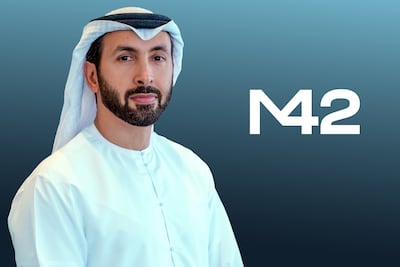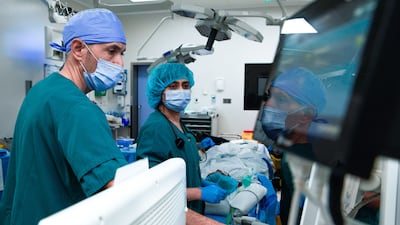Abu Dhabi's sovereign wealth fund Mubadala and artificial intelligence company G42 have launched M42, a “tech-enabled” healthcare company designed to advance medical research and capabilities in the UAE capital.
M42 — the result of a merger between the healthcare units of Mubadala and G42 that was first announced in October 2022 — aims to provide the highest levels of personalised, precise and preventive care, the company said in a statement on Monday.
It will manage a wide portfolio of assets, including Amana Healthcare, Biogenix Labs, Danat Al Emarat, HealthPoint Hospital, the HealthPlus network of speciality centres, Moorfields Eye Hospital Abu Dhabi, Imperial College London Diabetes Centre, Insights Research Organisation & Solutions, the Omics Centre of Excellence and the National Reference Laboratory, among others.
The launch of M42 is expected to “impactfully disrupt” the global healthcare industry, said Hasan Al Nowais, group chief executive and managing director of M42.
“Our vision is to transform lives through innovation by providing personalised and precise patient care,” said Mr Al Nowais, who is also the chief executive of Mubadala Health.
“We are confident that through our operating companies, M42 will create a future in which dedicated healthcare professionals are empowered by the latest technology to optimise patient outcomes.
“M42 also represents a platform for us to target international expansion and partner with global peers to solve the world’s most pressing healthcare challenges.”
The new entity will also consider opportunities for international expansion and new partnerships, as well as focus on collaborating with leading researchers and HealthTech ecosystems, it said.
The Covid-19 pandemic proved the resilience of the UAE as the country enacted sweeping health protocols and a vaccine mandate, and Abu Dhabi is charting a path to become a hub for the global healthcare industry.
The UAE capital has ambitions to capture the world's first population-wide genetic library, work on connected health, and build on previous collaborations with pharmaceutical companies Pfizer and AstraZeneca in medical research.
The Fatima bint Mubarak Centre at Cleveland Clinic Abu Dhabi, which opened last month, provides patients with personalised care, including screening and diagnostic testing, advanced radiation treatments and precision cellular therapies.

In February, Abu Dhabi said it would start clinical trials at Burjeel Medical Ceity to test the new drug Mitapivat, which that could transform the way thalassaemia — an inherited blood disorder and one of the most common genetic illnesses in the UAE — is treated.
In September, Abu Dhabi also unveiled a new funding programme to support research and innovation to fight life-threatening diseases, offered to those who carry out clinical research projects in critical health areas.
Meanwhile, demand for digital healthcare services is also continuing to grow, with venture capital companies tapping into this by boosting their investments in start-ups, especially those that provide diagnostics, testing and other support services.
The global digital health market is projected to grow 22.6 per cent to $407.72 billion in 2023, from $332.53 billion in 2022, and reach $1.7 trillion by 2032 at a compound annual growth rate of nearly 20 per cent, the latest data from Precedence Research shows.
group chief executive and managing director of M42
In August last year, Mubadala-backed G42 set up a $10 billion fund that will invest in emerging technology in high-growth regions around the globe as it looks to expand its portfolio of investments.
In October, Mubadala Health and G42 Healthcare signed an agreement to boost collaboration and find innovative solutions to treat chronic diseases.
“The future of healthcare lies in the incredible, fast-moving advances being made in technology,” Waleed Al Muhairi, chairman of Mubadala Health and deputy group chief executive of Mubadala, said at the time.
“We now seek to take patient care to the next level, into a new era of precision and personalised medicine.”


